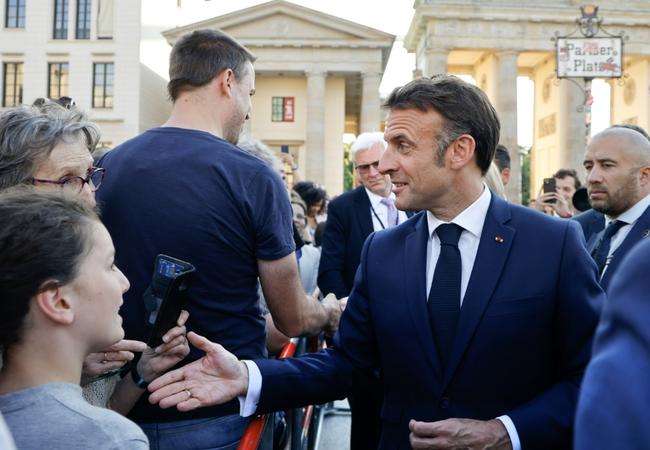Macron calls far-right rise an 'ill wind' for Europe
Macron calls far-right rise an 'ill wind' for Europe

France's President Emmanuel Macron on Monday raised the alarm over the "ill wind" of the rise of the far right in European politics, during a state visit to Germany ahead of key EU elections.
Macron noted a "fascination with authoritarian regimes" in Europe, singling out Viktor Orban's government in Hungary for criticism.
"Everywhere in our democracies these ideas thrive, pushed by the extremes and in particular the far right," Macron said in a speech in the eastern city of Dresden, a bastion of support for Germany's far right.
"This ill wind is blowing in Europe, so let us wake up," he said in front of the city's famous Frauenkirche church.
Macron's trip comes two weeks ahead of European Union elections in which polls are indicating his centrist coalition is trailing the far right. It could even struggle to reach a third-place finish.
Macron, undertaking the first state visit by a French president to Germany in a quarter of a century, made a plea for the defence of democracy against nationalist forces as he arrived on Sunday.
In Germany too, all three parties in Chancellor Olaf Scholz's coalition are polling behind the far-right AfD in surveys, despite a series of scandals embroiling the anti-immigration party.
After Macron's speech about 100 AfD supporters marched near the Dresden church.
- 'New responsibility' -
"Europe is not just a place where we give ourselves common rules, it is a set of values," Macron said.
"We must find the strength and commitment to defend it everywhere," he added.
Macron also underlined the threat posed by Russian aggression since the invasion of Ukraine, saying Europeans had a "new responsibility" to guarantee peace.
Without supporting Ukraine and stopping Russia from imposing the "law of the strongest" on the battlefield, there would be no peace in Europe, Macron said.
"In Ukraine, it is your security, our peace that is at stake," Macron told the Dresden audience.
And Europe, he said, must think about "its own defence and security".
In a joint oped for the Financial Times daily published after the speech, Macron and Scholz warned Europe was "mortal" in the face of Russian aggression -- a idea first coined by the French president.
"We can't take for granted the foundations on which we have built our European way of living and our role in the world," the two leaders wrote.
- Holocaust memorial -
Earlier, the French leader and his wife Brigitte Macron together with the German presidential couple visited the Holocaust memorial in Berlin that commemorates the six million Jews murdered by the Nazis.
Accompanying them was Nazi hunter Serge Klarsfeld and his German wife Beate, who underlined a resurgence of anti-Semitism, fuelled by Israel's offensive in Gaza following Hamas's attack on its territory.
"It's very good that the French president is meeting the German president before this monument, especially at a tragic time for the global Jewish community," said Klarsfeld.
The Klarsfelds have faced controversy lately over comments in favour of far-right leader Marine Le Pen, whom they praise for her engagement against anti-Semitism as opposed to her father Jean-Marie Le Pen.
Macron on Sunday labelled Le Pen's National Rally a "threat to Europe", stressing that he does not see them as "just another party".
The French president however skirted the issue as he presented the Klarsfelds with honours at the French embassy in Berlin to acknowledge their work "opening eyes" to the past and confronting crimes committed under the Nazis.
Macron will on Tuesday travel to Muenster in western Germany, where he will be presented with the Westphalian Peace Prize.
He will later meet with Scholz in Meseberg, near Berlin, for a joint Franco-German meeting of ministers.
Relations between the two leaders have been strained over their attitudes towards Europe and support for Ukraine, with the French president striking a more strident tone against Russia.
bur-sea/hmn/tw


